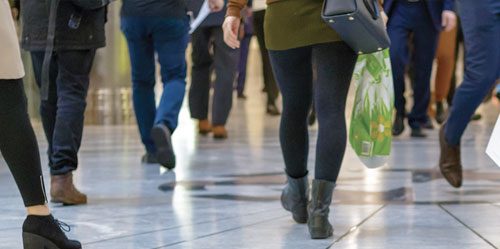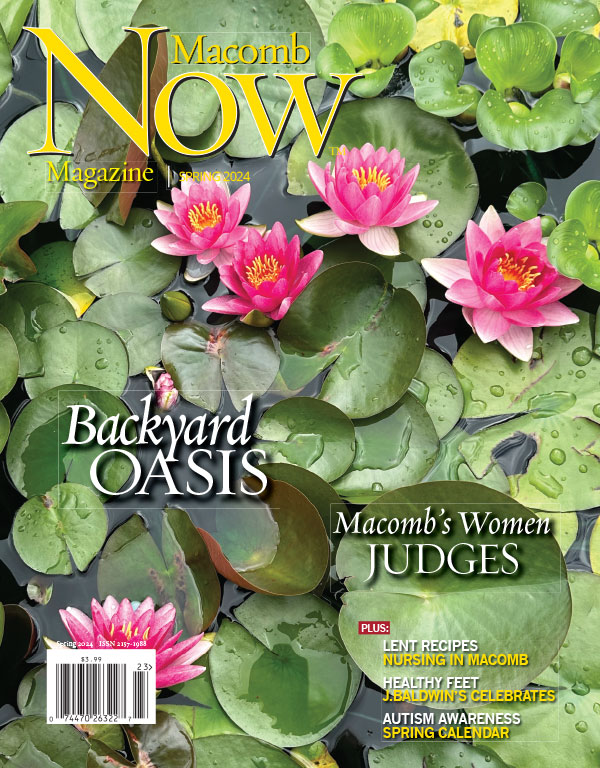Going Back Into Crowds

By Shelley Galasso Bonanno, MA, LLP
The term “reentry” is being used a lot lately as people discuss lockdown restrictions, due to the COVID-19 pandemic, being lifted and/ or eased. While we were previously powerless when mandated measures such as stay-athome orders were abruptly put into place, the process for transitioning from stay at home/ staying masked restrictions to resuming prelockdown activities is much less clear and has caused many some degree of reentry anxiety.
According to the American Psychological Association, almost half of Americans surveyed report feeling anxious about reentry. Reentry is a much more uncertain process and uncertainty generally causes anxiety. Many report feeling fear, nervous, worry or dread related to resuming activities that felt normal and safe pre-pandemic. Personal responsibility and choices regarding which seem potentially dangerous can feel overwhelming and fuel increased anxiety.
Anxiety is generally a response to perceived threat. The COVID -19 pandemic has posed a clear threat to human health and life, and the level of uncertainty during COVID-19 has been overwhelming for many. For some, the rules about social distancing, masking, and staying inside, felt safe and comforting. The transition now to resuming required or previously enjoyed activities while the pandemic is still ongoing, is a transition that can easily provoke anxiety, even for those that have been fully vaccinated.
Anxiety about reentry is normal and serves an evolutionarily protective purpose. That is, a certain amount of anxiety is useful for optimal performance and often serves to protect us from anticipated danger. In some situations, such as the COVID-19 pandemic, anxiety can help us stay safe, engage in appropriate preventive behaviors and avoid behaviors which pose a threat to our survival. However, when anxiety is out of proportion to the threat, it can be debilitating and at times even feel paralyzing, immobilizing one’s ability to transition. On the other hand, while we have been repeatedly instructed to socially isolate and/or maintain social distance for our own safety, social isolation itself has both shortterm and longer-term mental health effects.
While navigating this transition has proved diffi cult for many, there are things within our control and can make reentry feel more manageable.
Studies support the importance of social connectedness. Social connection is a positive, protective factor for mental health so it is vital to interact with others. Associating with like-minded individuals in making decisions about reentering social activities may increase feelings of being safe and supported, and in turn, serve to reduce feelings of anxiety.
Even if feeling anxious, it is important to start reentry activities soon. The longer we avoid them the more diffi cult it will be to overcome fear about them. Anticipatory anxiety, that is, the anxiety about thoughts related to doing the activity, can be much more debilitating than executing the actual event itself.
If possible, try to resume certain required activities, such as returning to the offi ce, gradually, in increments. For example, working two days in the office the fi rst week and three the next, rather than returning to a fi ve day work schedule the fi rst week, is best. Gradual, as opposed to sudden, resumption of an activity is most likely to be the most effective approach for reducing anxiety. Try not to put pressure on yourself or compare with others in the process.
There are many ways to manage anxiety. Mindfulness, or being present in the moment, can help reduce anxiety symptoms and enhance emotional well-being. Deep breathing and relaxation exercise can help one feel calm and grounded. Lowering of heart rate and blood pressure and lowering of stress hormone levels are some of the other effects seen with mindfulness practice. A mantra to remind us that the danger is now decreased can be very useful.
Feelings of a loss of control during the pandemic are normal. Regaining some sense of control in otherwise uncertain times by identifying what we can control can help reduce feelings of anxiety. For example, we can control which events we attend. Maybe we feel less anxious attending a small family gathering but are not ready to attend a large social gathering, such as a sporting or concert event. What feels safe and comfortable for one person may feel threatening and highly anxiety-producing for another. Only you know what feels right for you.
Remember, you are not alone. While feelings of anxiety or fear about reentry are normal, when reentry anxiety becomes excessive or starts interfering with our day to day activities, work, or relationships, it may be time to seek professional help. Many therapists offer remote therapy and teletherapy may be a good start if meeting in the offi ce does not yet feel comfortable. Therapy can be an invaluable process to help us feel a sense of control, address our fears and reduce our anxiety.
 A lifelong resident of Macomb County, Shelley Galasso Bonanno is a practicing limited licensed psychologist who earned her master’s degree from Wayne State University in 1987. She has a breadth of experience in working with adults, children, families, and couples. In addition to working in private practice, Ms. Bonanno performs consultative services for State and forensic agencies. She performs custody and parenting time evaluations and is a court approved mediator. Her writings have appeared in various online and print publications. An advocate for mental health, you can follow Ms. Bonanno on Twitter @shelleybonanno.
A lifelong resident of Macomb County, Shelley Galasso Bonanno is a practicing limited licensed psychologist who earned her master’s degree from Wayne State University in 1987. She has a breadth of experience in working with adults, children, families, and couples. In addition to working in private practice, Ms. Bonanno performs consultative services for State and forensic agencies. She performs custody and parenting time evaluations and is a court approved mediator. Her writings have appeared in various online and print publications. An advocate for mental health, you can follow Ms. Bonanno on Twitter @shelleybonanno.

